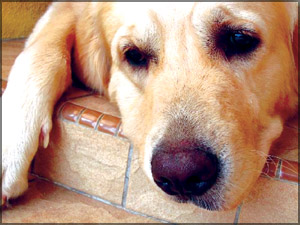Caring for your pet when you are sick
 Children
are always prone to illnesses. Even a slight cold or fever will keep you
in bed for several days and you will lose much of your strength and
mobility. When this happens, simple tasks like walking a dog or cleaning
a cat's litter box can seem like impossible tasks for you. Children
are always prone to illnesses. Even a slight cold or fever will keep you
in bed for several days and you will lose much of your strength and
mobility. When this happens, simple tasks like walking a dog or cleaning
a cat's litter box can seem like impossible tasks for you.
Yet, being down with an illness doesn't mean that you have to live
without your beloved pet; in most cases, you need not give up your pet.
After all, have you heard that your pet can make you better faster than
your medicine? Pets provide us with a source of affection, support and
acceptance; enable us to feel needed and valued; and ease the pain,
sorrow and loneliness often experienced during an illness.
How could pets increase your risk
of catching diseases?
Although pets can do wonders for your physical and mental well-being,
they can also catch and transmit diseases to you. To minimise the risk your pet poses to your health, you
must minimise the risks to your pet's health. The key is to understand
how best to care for your pet and to work with your veterinarian to keep
your pet healthy.
diseases to you. To minimise the risk your pet poses to your health, you
must minimise the risks to your pet's health. The key is to understand
how best to care for your pet and to work with your veterinarian to keep
your pet healthy.
Certain pets are more likely to catch diseases. That's why it is
recommended that exotic animals should not be kept as pets. Likewise,
puppies and kittens may be more susceptible (open) to disease and prone
to play-oriented nipping and scratching. And new pets may come with
incomplete or unknown medical histories.
This does not mean that you have to give up your playful puppy or
can't get a new pet. It simply means that you need to rely on a
veterinary surgeon to advise you on appropriate pet selection and care.
No pet is guaranteed to be or remain disease-free. But your
veterinarian can suggest preventive guidelines to keep a pet healthy,
test your pet for parasites and other problems and provide medical care
to help a sick pet recover.
And you can minimise the risks for you and your pet by keeping your
animal indoors, making sure it's well fed and groomed, and taking it to
the veterinarian for vaccinations and annual check-ups.
What can you do to protect
yourself?
If you have a weakened immune system, follow these precautions:
* Wash your hands after handling a pet.
* Wear rubber gloves when changing a litter box or cleaning up after
a pet, and wash your hands afterwards.
* Keep your pet's nails short to minimise scratches.
* Follow your veterinarian's advice on keeping your pet free of fleas
and ticks.
* Keep your pet indoors and use a leash outdoors to prevent your pet
from hunting, scavenging (searching for food among rubbish), fighting
and engaging in other activities that expose it to other animals and
disease.
* Keep your pet's living and feeding areas clean.
* Keep your pet's vaccinations up to date.
* Seek veterinary care immediately for a sick pet.
What can you do to meet your pet's
basic needs?
If your condition makes everyday pet care too challenging, you'll
need to find outside assistance to make sure your pet gets the food,
grooming, exercise and general care it needs.
If family, relatives, friends and neighbours can't help, there are
places, even in Sri Lanka now, where they will keep and care for your
pet until you get better, so you can seek such services when needed.
Janani Amarasekara |
